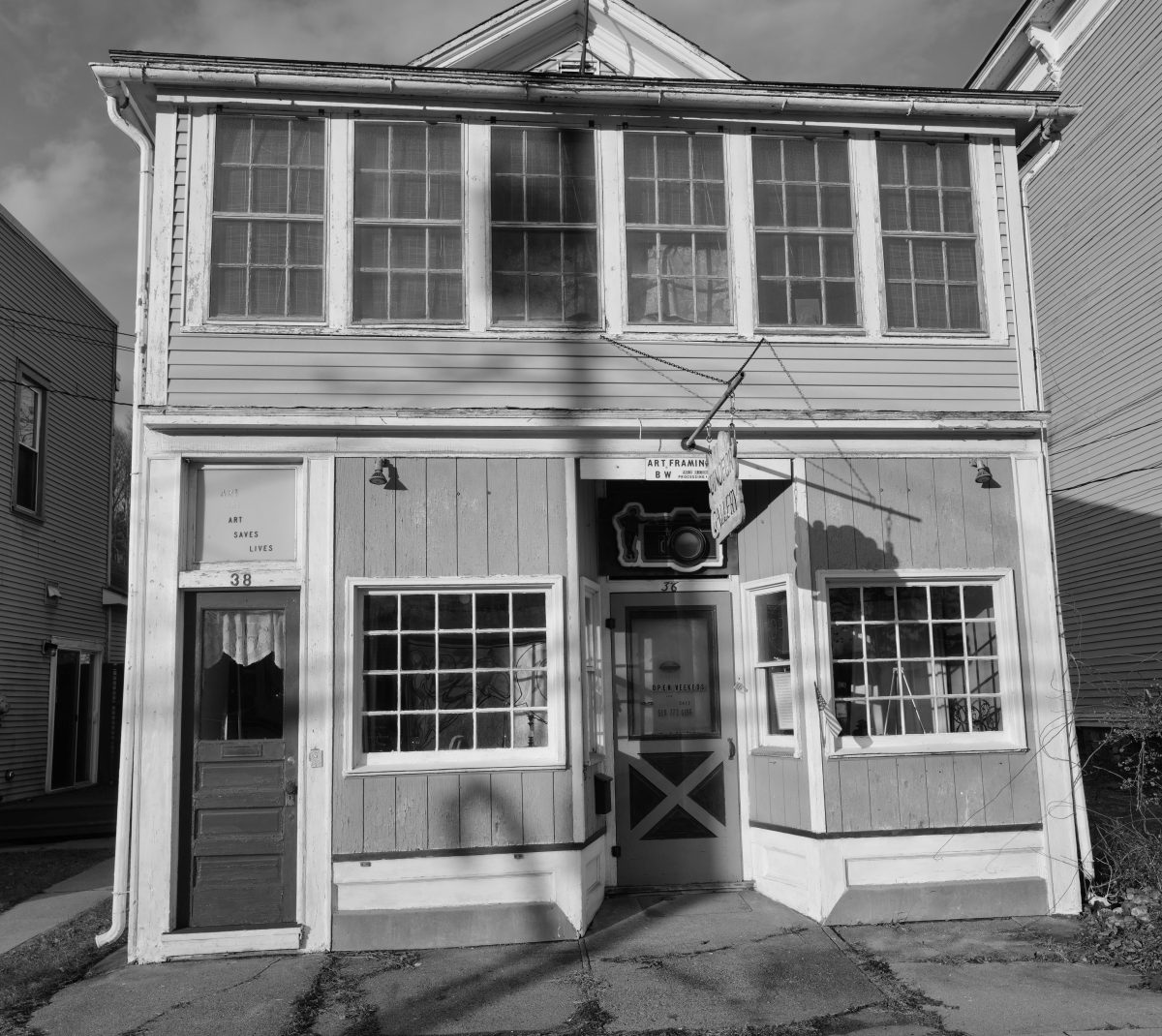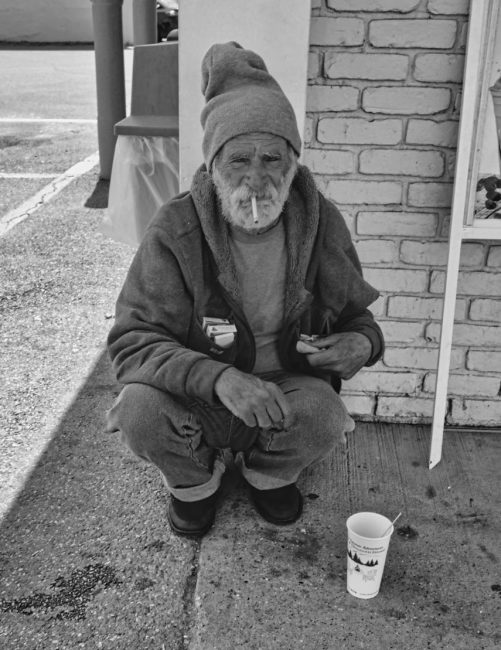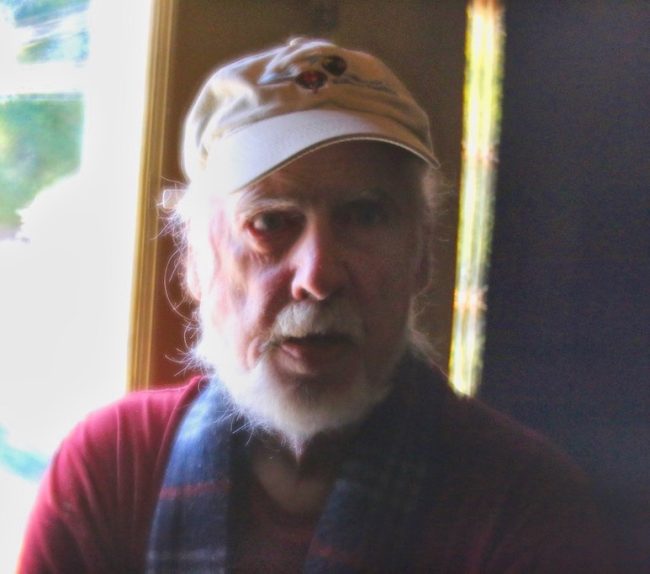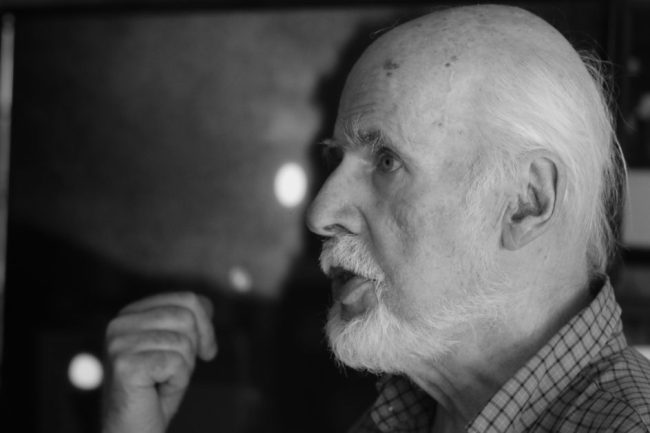I learned today that George Forss’s brother Mickey had been taken to a nursing home an hour or so away from Cambridge.
Micky lived on the second floor of George’s house, the Ginofar Art Gallery; he’s been there alone since George died.
There is a sign on the door to the residence which reads “Art Saves Lives,” and George should know, art saved his and Mickey’s as well.
George was on TV and the cover of Time Magazine when he was discovered as a street photographer in Manhattan. His art and skill at capturing light was the envy of every famous photographer in the world.
But notoriety and fame were not for him, and when some aliens visited him in Central Park and told him to move, he left New York and fame and wealth and never looked back.
This settling in a tiny upstate town in a house and gallery of his own was a version of a success story in George’s fantastical world. I loved George very much, he was a hero and a friend to me, even when I didn’t quite know how to talk to him or be with him.
As many of you may know, George Forss, my friend, and a world-famous New York City landscape photographer, took care of his brother Mickey for many years. Photography was his first love, caring for people was his second.
He sacrificed the first for the second.
Mickey was George’s stepbrother; they lived together before George was sent to an orphanage after the authorities determined his mother couldn’t care for him. His family was shattered.
Mickey, who suffered from schizophrenia after a drug overdose and breakdown in New York, broke down when he was young, and the two were separated for some years.
George searched everywhere for Mickey but couldn’t find him. One morning, George was having coffee at a New York City dinner, and a voice next to him asked, “how’s mom?” It was Mickey, who was then homeless and living on the street.
George brought him to Cambridge when he moved there. An uncle left him enough money to buy this modest wood-frame house on Main Street, and George turned it into a gallery, the Ginofar Art Gallery. He told me who it was named for, but I can’t recall the details. Some of the best artists in town often gave him their art to sell.
He never sold much art, but the gallery helped him to survive and was the center for his dreams.. When he turned on the lights in his darkroom, he had to unplug the refrigerator. He used his neighbor’s wi-fit for years and made his cameras and TV screens out of discarded garbage leavings. He was a genius at innovation.
George never quite figured out how to take his magnificent skyscraper landscapes in a place with no skyscrapers. He took photos to the end of his life, but could not quite ever reclaim his glory.
He kept a van on hand for his alien search missions, which were frequent.
He only saw one in all those years, floating above the Saratoga Battlefield. They didn’t contact him. He asked me if I wanted the van when he died, I flirted with the idea, but I’ll pass.
Mickey moved into the house, and George cared for him for more than forty years. He brought his ailing mother to the house as well; she lived there for years (she was a photographer and gave George his first camera. She also suffered from mental illness) and also looked out for a close but ill friend. George spent the rest of his life caring for other people.
Mickey had his room upstairs, and George made sure he took his medicine, had food to eat and clean clothes to wear, and a bed to sleep on.
Several times, he ran away and vanished for months. He always ended up somewhere in Brooklyn or Manhattan; George, who was nothing if not streetwise, always managed to find him and bring him back.
Like his brother, Mickey was always a sweet gentleman; he never said harsh words to anyone. He had a gentleness to him that was endearing.
He had George’s sweet and generous genes. But he was ill.
Many people got to know Mickey, who walked up and down Main Street every day, rain or snow or sun, drinking coffee, sitting and musing on a park bench, and smoking. I got to know Mickey and became one of the many people who watched out for him.
School kids would ride by on their bikes and toss him cigarettes and, often, some of their allowances. He was never harassed or mistreated. People bought him new clothes and passed on their old ones. He was always well-dressed.
Mickey is the only person I’ve ever paid to pose for me, and even though I knew the money was going for cigarettes, I learned how vital smoking and coffee were for him. It wasn’t for me to say no.
I usually paid him $5 for every photo. I can’t say we were friends, yet I think we were close in the only way possible. Mickey always seemed happy to see me, and I suspect the money was as much a part of it as anything, but he always asked after Maria – “how is your wife?” – and it was a rare week we didn’t see each other. He always asked me how my photography was going.
We would chat about George and the weather, and then I’d move on. Mickey wasn’t into long conversations. But he always had the best quality clothes, shoes, and sweaters.
I always ran into Mickey outside of Stewarts’ Convenience store.
As people do in small towns, the residents watched out for him. He came into the Round House Cafe every day while it was open, and Scott And Lisa Carrino always made sure he had coffee or something to eat if he was hungry. He sat in Stewart’s booth if it was free. Otherwise, he squatted outside on the sidewalk or found a park bench. At night, he went home to George’s house, had dinner, watched TV, and went to sleep.
Sometimes, Mickey smelled so bad he was asked to leave the places he came into to drink coffee. George would make him clean himself up. Mostly, he was allowed to sit and drink his coffee as long as the smell wasn’t too bad.
It troubled me to see Mickey sitting on a corner in cold or blinding snow or blistering heat. He wore winter jackets and shirts all year. George would take him to the doctor regularly, and everyone was always amazed at how healthy he was.
George died a few months ago. He left no instructions or provisions for Mickey, George never had much money, and what he had, he spent caring for other people. Mickey was now on his own.
I was approached after George’s death by a friend of George and Mickey’s; she wanted to raise money to fight for Mickey to stay in town, the only home he had had for most of his life.
I declined the request for help, much as it was well motivated. I believed Mickey could not safely care for himself, and he needed to be in a place where he could be supervised and helped when necessary.
After George’s death, I often drove to Stewart’s to see Mickey and ask if he was okay and give him some money, photos, or not. I was told the state was aware of Mickey and was “monitoring the situation.”
Mickey told me that he knew George was all right, but all that he said was “okay, okay.” That was his answer every time I asked. I noticed him deteriorating in cleanliness, neatness, and mood. He looked sad and lost. But never angry. I was sure he missed George dearly; he was the only person I think he was ever close to.
(Above photo: George in front of the photo he took of his ownly alien encounter as an alien investigator. The sighting was west of Saratoga five years ago: The lights ar a photo of e what he believes was an alien spaceship.)
I wouldn’t say I liked the idea of Mickey being taken away to a strange place and losing everything familiar to him. On the other hand, I hoped he would go to a nursing home or other facility where he could be watched.
I stopped seeing Mickey a week or so ago.
I’m already figuring out how to get him cigarettes.
So are some others. I guess I knew on some level that he was gone, but I didn’t want to accept it entirely. I knew his schedule well; he always got to Stewart’s by mid-afternoon. I had this fantasy that some wealthy person would take him on, build a small cottage and hire someone to watch over him.
That was a foolish fantasy; Mickey lived in the real world.
Today, it was confirmed to me that he was gone. He is in a facility where he has the freedom to walk around but not to leave the building. It’s not for me to say what’s best for Mickey, but I feel relief knowing he will be cared for.
I drove down to the Ginofor gallery with my Leica to capture the ratty but very friendly art gallery that was George and Mickey’s life for so long. Whoever buys it will surely change it and take down that “Art Is Live” sign.
When I learn where Mickey is, I’ll try to visit. I hope he gets to smoke. I doubt I will write about it if I see him; there’s too much feeling in it for me now.
Mickey’s departure is the end of George Forss’s life in my town and my life. He was a great friend for a long time, and although it became difficult to see him over these past few years, he has a massive place in my heart. It’s time to remember and then let go.
George was a great, eccentric, and brilliant spirit, and as a photographer, he took me under his wing, tutored me, and taught me about light and art. He could be frustrating and stubborn, but I loved him very much. Before he got into drugs, he told me that Mickey was also a brilliant and ambitious young student.
I can’t say I loved Mickey, I didn’t know him that well, but we had our connection, and it was essential to both of us, and very real I think.
I can’t play God and say for sure what is suitable for other people. As the winter approaches, it will be good not to worry if Mickey has warm clothes or a safe place to sleep. That would have been not very good to see.
Godspeed to both of them; George always would join the aliens when he died. “When the time comes,” he would say, raising his arms to the sky, “I’ll shout take me. I’m ready to go!”
George was one in a million in so many ways. His tiny and struggling art gallery ought to be a monument to the heroes of creativity to fight on for their work despite staggering odds in a country that most cares only for money. His legacy is some of the most remarkable landscapes ever taken of New York City.
And Mickey, who he cared for so many years.
I hope George is dancing with the aliens, which he very much wanted to do, and that the angels are waiting for their turn. George is one of them.





Jon, You can be so hard on yourself. You are good friend, because you accept people and their endearing crazy individual brilliance, which is really what it’s all about. Loving unconditionally. Thank you for writing.
Thanks Janet, I feel good about this, not bad…I’m not being hard on myself, at least not that I’m aware of. I wouldn’t do anything differently, and I am grateful he is in a place this winter where he will be cared for..
I am so sorry. Thank you Jon for being there and telling their story.
What a beautiful talent you have. Thanks.
Thank you for sharing about Mickey. Your words and pictures seem to evoke importance, discovery, understanding, empathy, compassion, acceptance… Stuff like that. Stuff about a person. About people, about us.
Good to hear you’re getting back in the saddle. And FWIW, interviewing students sounds like a great thing to do. Best luck.
Cheers,
Rufus
Beautiful.
Thank you for this beautiful obituary. Perhaps, in a shorter version, you might send it to The New York Times?
Thanks, Erika, for the good words. I don’t do shorter versions and have no need to be in the New York Times. As it happens, they published a long and very good obit on George, I told the reporter everything I knew. They don’t write the way I write, which is good news for both of us.
I have mixed feelings on this because, in my view, “safety” is over rated. I know there are places like The Mansion that are exemplary but there are too many that are not. Just this year a friend’s father was admitted to the hospital, dehydrated and with a stage 4 pressure ulcer that he developed by being “cared” for at the home he was at. The staff at the hospital said he appeared to be neglected. He didn’t survive.
In my mind, and this is just my opinion, nursing homes are “jails” for the elderly and if I’ve committed no crime, let me live and die in peace without outside interference.
Amy, as you message suggests, these are complicated decisions. I saw Mickey almost every day, and I am much relieved he will be under somebody’s watchful care. Local people were very nice to him and generous, but no one was solely responsible for his health and his care, and he was visibly deteriorating, mentally and physically, despite being brought food and clothing. I sensed he was living a very lonely life. You make very good points about safety and care for the mentally ill, but speaking only for myself, I’m glad he is where he is. And who is to say he can’t find happiness or friendship or other good things there? He may be relieved to be cared for by professionals, I can’t say one way or the other. He seemed emotionally and physically spent to me I’m not God, it isn’t for me to say what is best for him, that’s why we have trained professionals. At some point, I’ll see for myself. Many people were closer to him than I was, but I was much alarmed by the way he was looking.
I totally understand what you’re saying, Jon and I hope Mickey can find some joy in his new home.
I was speaking for myself mostly.
I appreciate your feelings Amy, it is so complex. I volunteer at an elderly care facility as you know, and so often people are brought in and they are devastated to be cut off from their own lives. Then, a month later they often tell me they were tired and lonely and now have friends and meals they don’t have to cook and rooms they don’t have to clean, and people to talk to. It happens all the time. In a month or so I’ll go out and see Mickey and take a look. He was done in when I last saw him a few weeks ago, it must have been just before he was taken away. He was physically and mentally deteriorating …I was fine to give him a few bucks when I saw him, but that isn’t the same as taking responsibility for his care and safety and health…I understand what you are saying also Amy and I respect it..
I had heard that Mickey was moving to a home and, like you, I knew it was for the best (given the lack of heat in Ginofor) but I couldn’t help think how he’d miss his walks through the village. Whenever I encountered him on the sidewalk, he would cross to the other side of the street, sometimes moving slower than passing cars would have liked. But every now and then, often near Stewarts, we’d be close enough for me to wave and say “hi”. He’d look, he’d stare, and deep inside him I sensed he was acknowledging me in his own way. Good people throughout the community have watched over Mickey for years and now we all miss him and wish him well.
And George, well he’s probably thrilled to finally be with the Aliens ;- )
this is a lovely, heartfelt tribute to both George, and Mickey. I trust George is *where* he wanted to be……….and I’m relieved to hear that Mickey will be cared for. It is so difficult for people who live on the fringe…. it is good that he had so many people advocating for him and looking out for him and that his basic needs will now be met. He will do just fine, I think…………different…..but fine. It would be nice if you can see him again one day
Susan M
A wonderful recollection of the memories and thoughts about the time you shared with George and Mickey.
I will think of your story next time I am in town visiting my Mom (who resides at The Cambridge.)
Thanks, Christine, Ginofor was quite a special place..George never gave up on his creativity…